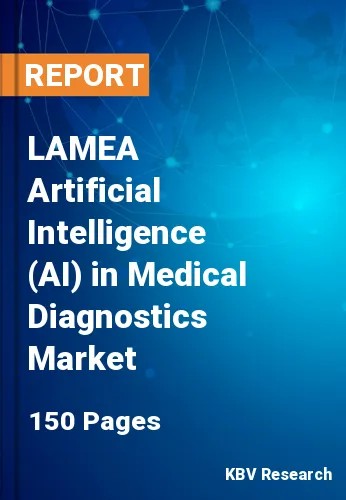The Latin America, Middle East and Africa Artificial Intelligence (AI) in Medical Diagnostics Market would witness market growth of 47.8% CAGR during the forecast period (2022-2028).
Artificial intelligence can detect and identify colorectal cancer as accurately as pathologists by examining tissue scans. Additionally, artificial intelligence can aid in determining the optimal treatment course for patients. Additionally, researchers can utilize predictive analytics in order to determine how a cancer patient would respond to a particular medicine. Over the past several years, researchers have investigated AI-based diabetes treatment strategies.
Self-management, remote monitoring of patients, and support via wearable gadgets are examples of distinct strategies. Continuous glucose monitors provide individuals with a better picture of their blood sugar levels by estimating blood sugar levels every five minutes without requiring finger probes. Researchers would be able to construct models that better forecast the influence of meals as well as insulin on glucose levels, resulting in improved control of blood sugar.
It is anticipated that artificial intelligence (AI) would gain traction in diagnostics as a result of growing investments by non-profits and private companies to improve information exchange, therapeutic outcomes, and cost reductions. In addition, increased government spending on healthcare stimulates demand for e-diagnostic services within the healthcare industry, hence contributing to market expansion.
The Healthcare industry of regional countries is rapidly growing. Through the establishment of a National Health Insurance (NHI) program, South Africa is taking steps toward providing healthcare for all of its citizens. According to the International Trade Administration, as a result of the NHI, the government would very certainly take over as the primary purchaser of medical supplies and services, in addition to making investments in the public healthcare system to enhance its accessibility and infrastructure. The NHI is being implemented gradually, and its entire rollout is expected to take place by 2026.
The Brazil market dominated the LAMEA Artificial Intelligence (AI) in Medical Diagnostics Market by Country in 2021; thereby, achieving a market value of $159.1 million by 2028. The Argentina market is showcasing a CAGR of 48.6% during (2022 - 2028). Additionally, The UAE market would register a CAGR of 47.4% during (2022 - 2028).
Based on Application, the market is segmented into In Vivo Diagnostics and In Vitro Diagnostics. Based on Vivo Diagnostics Specialty Type, the market is segmented into Radiology, Cardiology, Neurology, Obstetrics/gynecology, Ophthalmology and Others. Based on Vivo Diagnostics Modality Type, the market is segmented into Computed Tomography, X-Ray & Ultrasound, Magnetic Resonance Imaging and Others. Based on End User, the market is segmented into In Hospitals, Diagnostics Imaging Centers, Diagnostics Laboratories and Others. Based on Component, the market is segmented into Services and Software. Based on countries, the market is segmented into Brazil, Argentina, UAE, Saudi Arabia, South Africa, Nigeria, and Rest of LAMEA.
Free Valuable Insights: The Global Artificial Intelligence (AI) in Medical Diagnostics Market is Predict to reach $7.3 Billion by 2028, at a CAGR of 39.6%
The market research report covers the analysis of key stake holders of the market. Key companies profiled in the report include Microsoft Corporation, Nvidia Corporation, IBM Corporation, Intel Corporation, Google LLC, Siemens Healthineers AG (Siemens AG), General Electric (GE) Co. (GE Healthcare), Xilinx, Inc., Digital Diagnostics, Inc. and InformAI, LLC.
By Application
By End User
By Component
By Country
Our team of dedicated experts can provide you with attractive expansion opportunities for your business.

